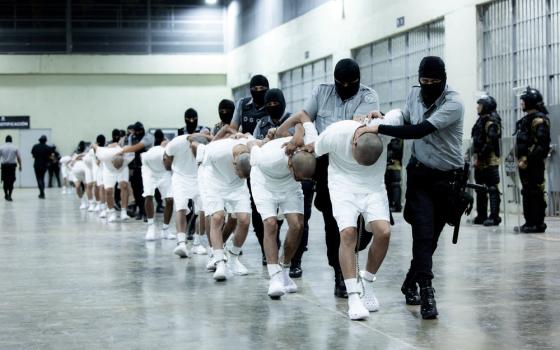
Franz Jagerstatter, an Austrian farmer, was beheaded in 1943 after refusing to fight in the Nazi army. (CNS)
The Friends of Franz Jägerstätter peace group want their message of nonviolence to take root with U.S. Catholics. It may be a challenge, they admit, but they've turned their focus to what they hope is a more sympathetic group: young Christians.
"I'd love to convert all the bishops, but I don't think that is going to happen," Michael Baxter, a theology and ethics professor at DePaul University in Chicago, said in a conference call with reporters. "Yet I know there are a lot of young people who will be moved by it."
Friends of Franz met this weekend in upstate New York and welcomed a special guest: Maria Jägerstätter, daughter of the group's namesake. Franz Jägerstätter, an Austrian Catholic farmer executed for refusing to serve in Hitler's army, was declared a martyr by Pope Benedict XVI in June 2007 and was beatified by the church in October of the same year.
The Franz Jägerstätter People For Breaking the Silence, or Friends of Franz, has members throughout the United States and Europe who speak out against violence and war because, according to the group, silence on the issue is a form of participation.
The 25 members in the United States have been lobbying the U.S. Conference of Catholic Bishops to more outspoken against militarism and have organized Lenten periods of prayer, fast and reflection.
In a conference call Sept. 27, group members discussed the need for their message to be heard, the encouraging climate Pope Francis has spurred in today's church, and how they hope to seize the moment and get their message out.
Their primary goal is to ensure Jägerstätter's story is heard by as many Catholics as possible, which they hope will turn the tide against militarism in the United States.
"It seems to me probably the most powerful thing to do to change people's hearts and minds is simply to tell this story as best we can," Baxter said.
Jägerstätter was an ordinary Austrian farmer when Hitler's army marched into his country in 1938. After the invasion, Jägerstätter, who was married with three children, was to be drafted in Germany's army. Believing the war unjust and incompatible with his Catholic faith, he refused conscription. His refusal cost him dearly: After months in a German prison, Jägerstätter was beheaded in 1943.
For years, the details of Jägerstätter's life went unnoticed. Maria, his own daughter, said she did not know her father's story was "special" until years after he died.
After the details of his life were uncovered, Jägerstätter was beatified on Oct. 26, 2007.
Members of the Friends of Franz say his story deserves close study among Catholics because his decision to refuse military service was rooted in faith.
"If we tell the story of Jägerstätter, it has to be the whole story," said Fr. Emmanuel Charles McCarthy, a Melkite priest and longtime pacifist. Jägerstätter's "morality came out of a spirituality that is directly related to the understanding of God through Jesus Christ."
The spirituality that drove Jägerstätter to take a stand against an unjust war is largely absent from the U.S. Catholic church, according to the group. There's hope among them, however, that Pope Francis' shift in tone will change this.
"We feel that this is a major turning point but hope we are not disappointed," said Jack Gilroy, a member of Pax Christi and Friends of Franz. The Friends of Franz want to see more action from the U.S. bishops to show they share the pope's sentiment.
"[The bishops] make it sound like they are on the same page as the pope when they haven't been for 20 years," Gilroy said. He said his group would like to see from the bishops an "absolute statement that faith and violence are incompatible."
Besides a statement, the group has a number of suggestions to more fully align the U.S. Catholic church with Jägerstätter's tradition of nonviolence. For starters, "get the junior ROTC out of Catholic high schools," McCarthy said.
Other members say there is no need for an Archdiocese for the Military Services or special collections that fund the archdiocese.
The Archdiocese for the Military Services was created in 1985 to provide Catholic pastoral ministry to members of the U.S. armed forces and their families. While military chaplains are themselves members of the armed forces and receive salaries from their branches of service, the military archdiocese is not part of the military. Last year, the U.S. bishops' conference approved a national collection to aid the military archdiocese. The collection will be taken up for the first time Nov. 9-10, the weekend before Veterans Day, and repeated every three years.
Friends of Franz want to make Jägerstätter's story resonate with lay Catholics. Members of the group have written plays in an attempt to reach a wider audience. One of the plays, "The Predator," is an effort to educate the public about drone warfare. It's their hope the play will be performed on Catholic college campuses.
"We have to think what we can do in terms of going into high schools and speaking at college campuses," Baxter said. "We have the power to do it ourselves in the same way Dorothy [Day] started the Catholic Worker movement. We have to be willing to organize."
It's a tactic that's worked in the past.
McCarthy said Jägerstätter's story had a profound effect on students at the University of Notre Dame during the Vietnam War. As a professor, McCarthy invited Gordon Zahn, the man who uncovered Jägerstätter's story, to speak to his students. The students related to Jägerstätter's story because he was driven by his faith to take a heroic stand, McCarthy said.
"It made an impression," McCarthy said. "I'm sure students applied to be conscientious objectors after it."
[Ben Feuerherd is a freelance writer based in New York.]



